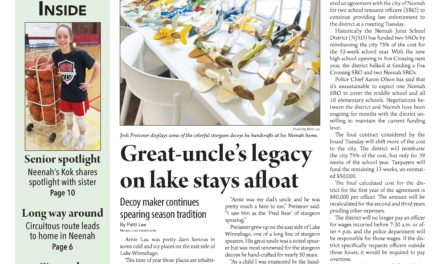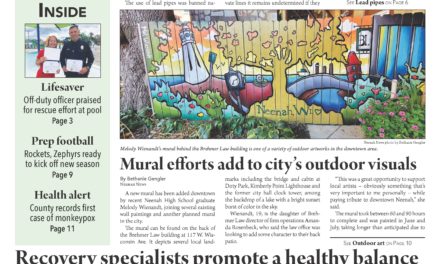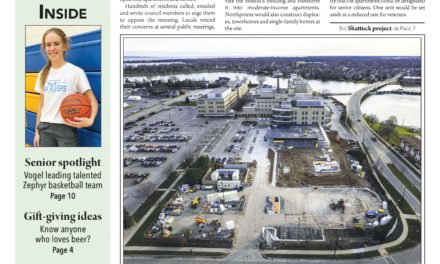Conflict resolution seeks better outcomes
By Cheryl Hentz
Herald contributor
Millions of lawsuits are filed against people and companies every year, but in Winnebago County there’s a way to settle lawsuits – and other disputes – instead of going to court, and often before they get filed with the court.
Since 1990, the Winnebago Conflict Resolution Center (WCRC) has been giving people an opportunity to settle their disputes privately, using professional mediation instead of going before a judge or jury.
WCRC was started by a group of local people from the legal, business and church communities – known as the Oshkosh Peace Project (not to be confused with the Oshkosh Civility Project) – who strived to find ways to create and promote more peace within the community. Eventually, they thought it might be good to stretch those efforts to the court system and make it countywide.
They got professional mediation training at one of the longest-standing conflict resolution centers in the country and from Dick Blackburn, “a legend in the mediation world” according to Michael Rust, JD and the executive director of WCRC for the last nine years.
Because of the Oshkosh Peace Project’s efforts, Winnebago County was at the forefront of this mediation process and today remains one of the few counties in Wisconsin to have a professional mediation process for dispute resolution.
The process works like this: If you have sued someone or are being sued, you and the opposing party will be required to listen to a mediation orientation. After that, both parties will be given an opportunity to mediate their differences with a professional volunteer mediator. If both parties choose to do that, you begin mediating right then; if not, your case will be scheduled for a later date before a judge or jury, depending on the type of case.
In mediation any resolutions the parties come to are legally binding and because the parties have settled things out of court, the suit is dismissed – and it hasn’t cost them any more money to do so. If someone defaults on the agreement the parties reached, the court will enter a judgment against the party that defaulted.
Pat Nichols has been volunteering as a mediator since the center was founded and was one of those who was trained by Blackburn.
“I think the greatest benefit of mediation is that the parties make the decisions. They’re the ones who come up with something that’s going to work for them,” she said. “As mediators, we approach it from a non-legalistic standpoint. What we look at is what’s going to solve the problem; not what the law says.”
People come to WCRC in two different ways, said Rust.
“The more common way is that people are referred to mediation by the court system – either because they’ve filed a small claims suit against someone or someone has filed one against them; the other way is to call the center directly.”
Say you’re having a dispute with a roommate, friend or family member. People can call the center and talk to them about mediation. One of the reasons most people don’t know about this option, Rust guesses, is because they’ve not heard of the center.
The center does about 500 mediations every year – about two-thirds of those are small claims actions. “Of that amount, landlord-tenant disputes make up a good percentage of them. We also see other collection cases such as unpaid credit card bills, or unpaid medical bills,” Rust said. “But we also see cases, for example, where someone had some work done on their house and didn’t like the result; we sometimes see roommate disputes. The small claims arena is ripe for all different kinds of cases.”
That includes disputes over property when a couple splits up, including even dog custody issues.
“Courts can’t do some type of joint custody arrangement for a dog or cat, but that is something that we have done and have become very good at crafting with the parties involved,” he said.
“We have a legal system, but not a justice system. Things may be legal, but they may not be just. The rulings that the Courts have to give are ones that follow the law, by what’s been set down by the Legislature. They may not take into account the very real and very important factors about why you didn’t do something, or why you didn’t pay. Those are very important factors, but the court isn’t allowed to consider them.”
They do not do mediations for placement and custody. Those issues are mediated through Family Court Services.
Nate Olson of Olson Legal Group has frequently used the center’s mediation services. He said that in the vast majority of issues, it’s effective and people settle.
“They realize they can have a hand in the settlement, and it takes away the unknown (about the court system and how it works and might end up). It also gives them some finality,” Olson said. “It’s a relaxed environment and you don’t have all the formalities of a courtroom. You’re sitting across from the other party and sometimes someone just has to get something off their chest. Once they do that, they get affirmation from the other person that they’ve heard your concern, and then they’re in a place where they’re ready to settle.”
One of the main points Rust wants to emphasize is that people do not have to file suit or be sued by someone to use mediation services. And, as a resident of Winnebago County, a person could be eligible to receive up to three hours of mediation free.
If you would like to volunteer as a mediator, there is a process to go through, but it’s one that’s thorough and rewarding overall. The center is one of the few places in Wisconsin that trains mediators.
“Legally in the state of Wisconsin, you need a license to give a $5 haircut, but you don’t have to have a license to be a mediator for a multimillion-dollar case.” Rust said. “There’s no regulation or licensing of mediators in Wisconsin at all. If someone wants to be a mediator for us, they’re going to be professionally trained. It’s the same training we provide for professionals who want to become mediators.”
The training is 40 hours and is usually held during a week in June. Rust said training is an intense process where they go over a variety of topics: communications skills, listening skills, approaches to conflict, the process of mediation, how to handle disruptive behavior and power dynamics.
“We cover all sorts of factors that can come up in the process of mediation. And we give the trainees an opportunity to try it, in which we have a lot of hands-on skill-building, as well,” he said. “Once they’ve completed that 40-hour training, we require them to observe eight hours of actual mediation with our volunteers. They then have to co-mediate with an experienced volunteer mediator for an additional eight hours. So, it’s not until they’ve finished that 56 hours do we consider our volunteers ready to actually try to mediate cases.”
“The cost for training is $825, however, if people are willing to guarantee that they’re going to volunteer with us for a year, we are willing to underwrite most of the cost of the training, so they would only pay $150,” Rust added.
Those either interested in using the center’s services or interested in becoming a mediator can contact 920-236-4925 or mediationwcrc.org.






